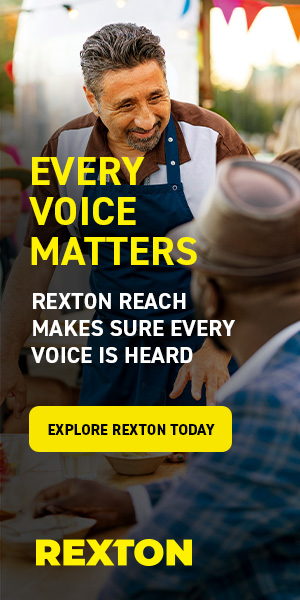Interview with Jackie Clark, Ph.D., AAA Humanitarian Award Winner
Share:
Topic: Audiology Missions to Mozambique
Dybala: Today, I am speaking with Dr. Jackie Clark from the UT Dallas Callier Center who was recently awarded the American Academy of Audiology Humanitarian Award at the 2006 AudiologyNOW meeting. Jackie, thank you for meeting with me today
Clark: Certainly, my pleasure!
Dybala: Just to get things rolling, tell us about your start in the field of Audiology.
Clark: After graduating with a B.S. in Merchandising from Colorado State University and working a few years in the buying office and managing a major department store in Texas, I decided to pursue my childhood dream of being a "Speech Audio-ologist". What a shock to discover I had been using the wrong terminology, but fortunate that I could indeed follow both disciplines. So, actually my Master's Degree from UT Dallas was in Communication Disorders with a major in both Speech Pathology and Audiology. My Ph.D. from UT Dallas was in Human Development and Communication Sciences with minors in Neuroscience and Disorders of Language and Learning. I was fortunate that I could tailor my doctoral program to focus on clinically relevant topics to Audiology.
Dybala: What has your work focused on professionally?
Clark: Out of the 19 years working as a licensed audiologist, I have worked the past 7 years as a Senior Clinical Audiologist at the UT Dallas Callier Center www.callier.utdallas.edu/ with a patient case load involving diagnostic and rehabilitative/habilitative services for the crib to cane population. I am a faculty member at the UT Dallas School of Behavioral and Brain Sciences bbs.utdallas.edu/. I teach Introductory Audiology, Advanced Audiology and Pediatric Audiology. In addition to teaching duties, I enjoy researching clinical aspects/efficacy of tests of physiology and behavioral audiology (such as otoacoustic emissions, speech in noise performance, and auditory evoked potentials). Though, lately it seems that I have been on a writing "binge" with several book chapters completed and a few left in the works.
Dybala: I would also like to mention to our readers that like Dr. Clark, UT Dallas is my alma mater as well. So, without any bias whatsoever, I would like to say that the Callier Center is a really special place with some special people, and Dr. Clark is a part of that.
Clark: Well, thank you Paul. I tend to be thought of as the "special" person here at Callier, but for other reasons!!
Dybala: (Laughs) I know that you are also involved at the State and National and International levels in various professional organizations. Could you tell us about those?
Clark: Well, let's see. On the state level, for the past few years I have been the Director of Publications for the Texas Academy of Audiology newsletter (published 3x a year) with a distribution of 957 audiologists. On the national level, I have been involved with various short term committees within the American Academy of Audiology. Internationally, I am charged with the duty of a managing editor of The International Journal of Audiology, and feel privileged to interact with a number of authors and academics worldwide. I am also blessed to work with a passionate group of hearing health care professionals/audiologists around the world as the Chair of Humanitarian Audiologists Committee within the International Society of Audiology (ISA). I also have been appointed as the web liaison for ISA. My participation in the Humanitarian Audiologist Committee is one of the most rewarding areas I have been able to work in.
Dybala: If I am counting correctly, you have been traveling to Mozambique now for 7, or is it 8 years now? How did you get started and what was your inspiration for doing this?
Clark: Actually, this will be my 9th year to be "on-site" in Mozambique. I began the Mozambique Audiology Project in the fall of 1997 after two elderly ladies from my church approached me about going with their "team" to Mozambique in 1998. Of course, being a State of Texas employee, there was no chance that I could personally fund the entire audiology project, but I assured them I would give it serious consideration. After a letter writing campaign, phone calling, begging, and cajoling, I found myself with: a donated Beltone portable audiometer, a Teledyne immittance unit, a handful of hearing aids, literature on hearing and hearing loss written in Spanish, stock earmolds, tubing, glue, a years worth of batteries for the donated hearing aids, and lastly (and most importantly) my travel and room were totally underwritten! Miraculously, 1997 was the introduction of phone lines in Mozambique that allowed the missionary nurse employed at the Rural Hospital (where we were to base ourselves) to send and receive email!! Can you imagine, communicating with someone on the other side of the world - in the third poorest country in the world - responding enthusiastically about the chance of bringing audiology to the "bush" of Mozambique.
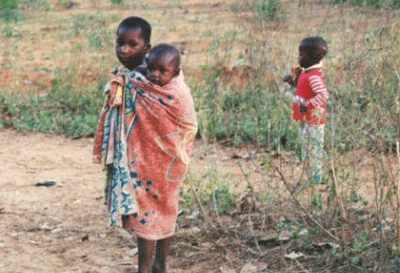
Figure 1. Mozambique children.
Well, 1998 was a small success by developed country standards, but I realized 4 years later that there was still NO AUDIOLOGY and the only HEARING AIDS dispensed in the country of Mozambique were from my project. Though the project was small it was quite a beginning and I knew what my long term goal was. They say that the sand flea in Africa will burrow deep under bared skin, and is quite difficult to get rid of. For me, Mozambique has become a sand flea - it just got under my skin.
Dybala: What is the long term goal of your Mission to Mozambique?
Clark: My job in Mozambique is to work myself OUT of a job in Mozambique!! The only way I can accomplish this goal is to have a self sustaining program with a home grown Mozambican Audiologist overseeing the multiple programs we've created. So far we've gotten some key Medical Technicals at the local hospital trained in the diagnostic evaluation, trouble shooting hearing aids, making earmold impressions and dispensing hearing aid batteries.
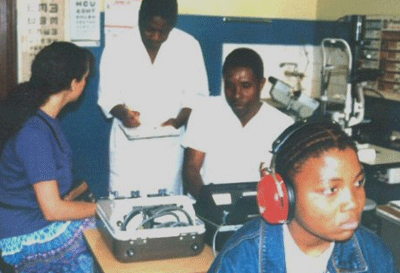
Figure 2. Training Medical Technicals at the local hospitals.
The key Social Action workers are trained to conduct hearing screenings to enable them to identify more children with hearing loss and then refer them to the Medical Technicals at the local hospital. Every year we interact with a cohort group of hearing impaired children that attend the local primary school. Until last year these children attended school together in one classroom with a teacher who knew a small amount of sign language. Unfortunately, the children have no advocates in the system and the curriculum was modified so that the hearing impaired children are all mainstreamed and expected to perform orally. This was not the appropriate education setting for these children with hearing impairment. This coming summer we will be setting into place a separate school for these children where they can finally be educated appropriately. One other exciting facet that we started last year was the first large scale mass hearing screening in the country of Mozambique at the primary school we work at. In 4 ½ days we managed to screen 1177 children in the 1st, 3rd, and 5th grades. We were able to refer children to an accompanying otolaryngologist for surgery or medicine if there was an apparent need; advise parents, teachers and school administrators if a child had a hearing loss; remediate with hearing aid those children who were audiologically diagnosed with hearing loss. This year we will continue the first demographic study of hearing loss in Mozambique with repeat program from last year.
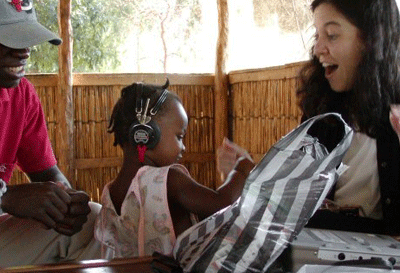
Figure 3. Performing hearing screenings in the schools.
Many of the components to a successful hearing health program within the country have been laid into place, and I'll continue building until we get a qualified Mozambican to take over the reigns. In my minds-eye I see one day having ABR testing available; infant hearing screenings; cochlear implantation; and more prevalent use of hearing aids in Mozambique of the future.
Dybala: What do you see for the near future? Do you have an additional program planned for this year?
Clark: In Mozambique, the otolaryngologist joining us this year will be co-teaching with me to the physicians on anatomy of the ear, basic hearing and hearing health care; use of otoscopes; identifying and treating pathology; and possibly introduce the concept of p.e. tubes.
Dybala: You mentioned the ISA Humanitarian Audiologist Committee. Can you tell us more about the committee? Have you collaborated on with any other humanitarian efforts in other parts of the world?
Clark: Working on the Humanitarian Audiologist Committee is another passion of mine. There are so many people who return from a mission only to discover that there are number of people who have traveled to the same place with the same mission, or learn that there are audiologists locally, or that a different host would have been more amenable to the program. The purpose of the committee is to keep people from having to re-invent the wheel each time they go in the field to work. We also work rigorously to get more audiologists to become aware of the World Health Organization Guidelines for providing hearing health care and hearing aids in developing countries. There are a number of programs we are working on, and currently I have an email address list of over 400 world-wide humanitarian audiologists/hearing health care professionals. The Humanitarian Audiologist Committee within ISA continues to grow since its inception just about 4 years ago!! It's an exciting time.
As far as other humanitarian efforts, I've been asked to start similar programs in Camaroon, Malawi, and other developing countries. The gypsy side of me would love to do just that - the state employee side of me realizes the impossibility of such a notion. What I do in Mozambique really is not unique. This is what makes the ISA Humanitarian Audiologist Committee work so important. It's possible to easily pass along strategies, guidelines, visions to many other compassionate people with a desire to help who have the capability of making a commitment to Camaroon, etc.
Dybala: Tell us about the preparation that you have to undergo to make your mission work. How much do you have to raise in the way of equipment, supplies and money?
Clark: It takes me a full year to be prepared for the 2 week on site program in Mozambique. Travel costs alone are approximately $2200; room & board while on site is an additional $400 that all comes out of pocket or donation. I've been quite fortunate over the years to build a good relationship with compassionate industry folks from Widex, Rexton, Phonak, Starkey, Hal-Hen, Oak Tree, Insta-Mold, Sy Kessler Sales, GSI, and Biologic who have either donated or provided tremendous discounts for products. We typically dispense between 20 - 30 hearing aids, with the necessary supplies during our 2 week stay. You can imagine the exponential demand on products that such a program would create. The more hearing aids dispensed in Mozambique, the greater the demand for batteries and supplies. It becomes a vicious circle, but SO FAR, I am still able to bounce around inside of that circle!
Dybala: I am tired just thinking about all that you have to do each year just to prepare for a 2 week trip, let alone the amount of work during the trip. I have to ask, what keeps you going?
Clark: Sometimes the host in Mozambique worries about imposing too much on us during the 2 week mission. I just remind them I have plenty of time to rest when I'm dead. When you spend so much time and effort to get half-way across the world, you don't want to waste one micro second of the time allotted. I've never been able to sit still and end up hunting down things to keep occupied with if there isn't enough to do. Unlike U.S. culture, African culture seems to accept inactivity and lack of a forward movement to programs. I've discovered that while in Mozambique there is a high probability that any program I plan for on one day may not happen, and always have back-up programs for the day. Consequently, I maintain a number of programs in Mozambique.
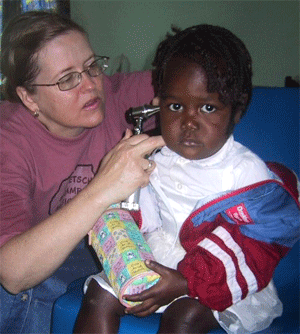
Figure 4. Dr. Clark performing an otoscopic exam.
Dybala: Do you have any students or faculty members come along with you?
Clark: Part of being on faculty in a university is to demonstrate standard care of practice. It goes without saying that my standard care of practice sphere has expanded markedly since 1997. It's exciting to have students join in the project since they see so many pathologies and interesting cases they would NEVER see in the U.S. Can you also imagine being a 2nd year Au.D. student and taking a patient from triage through dispensing a hearing aid in one encounter? Of course the students are supervised, but they are forced to think while working, question ideas they may have heard in the classroom, seek culturally sensitive means of counseling patients, and adapt to the stark realities working in the realms of a developing country where computers and probe mic measures are non-existent.
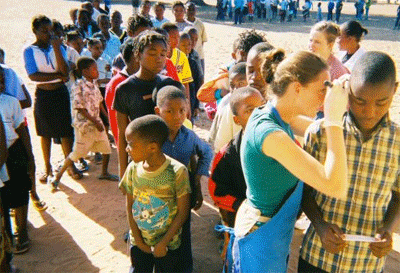
Figure 5. A student performs otoscopy on children waiting to be screened
Over the years I've had some of my own students from UT Dallas as well as students from other universities around the world join me in Mozambique. Though I come close each year, I still have not been successful in having other faculty members from UT Dallas accompany me. The Mozambique Audiology Project Multi-national Team members that I had with me for 2005 included: Denise Herrara, of University of Texas in Austin, Texas; Darrell and Sissy Johnson, of Austin, Texas; Tendekayi Katsiga of Otse, Botswana; Dwalilani Keatholetswe of Otse, Botswana; Victoria Lee of Northwestern University; Crystal Rolf of Wales, United Kingdom; Julie Verhoff of UT Dallas/Callier Center; and Kathleen Wemmer or Johannesburg, South Africa.
Dybala: As we sit in your office, I see that you have several pieces of native art that you have brought back from Mozambique. Out of all of your trips, what are the top 3 memories that you have from your missions?
Clark: You've given me a pretty tall order to limit the millions of joyful and sad memories since 1998 in Mozambique! Let me try!
Last year I met little 6 year old Belucha, who had the eyes of a distrusting 80 year old. She appeared to come from a harsh background and would not trust any adults. In all of my years in pediatric audiology, I've never come across a child so terrified of what an adult might do to her when we were attempting to simply screen her with an OAE, or audio or tymp. We eventually persevered and discovered that she has a severe hearing loss and would likely achieve good benefit with hearing aids. It took quite a bit of time to get the earmold impressions completed and hearing aid fit, but her beautiful smile (showing rotten teeth) made the ordeal abundantly worthwhile for me.
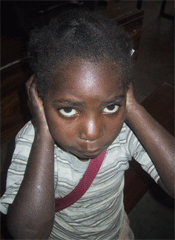
Figure 6. Belucha.
Servalito was the first person in Mozambique to receive hearing aids. This seemed appropriate to me since Servalito is an orphan who showed up roaming in the town as a toddler, and no one knew his story. When I met the very street-wise Servalito in 1998 he was approximately 16 years old with a number of self-created hand-signs, and he lived at the orphanage. Dispensing hearing aids to him was an eye opener for the Medical Technicals I train since they had never seen a "hearing apparatus", and were quite impressed with what a person might be able to hear. Every year that I've returned, Servalito seemed to know that I arrived in Mozambique and would come where ever I was staying to say "hello".
Reverend Metatiki is quite unusual by Mozambique standards; he has survived 40 years beyond life expectancy to 80 years old. He speaks good English and enjoys engaging English speakers in conversation to maintain his English skills. After being audiologically diagnosed with a moderate to severe hearing loss and subsequently dispensed a hearing aid with supplies he was counseled thoroughly about care and use of the hearing aid. Before he was released, he demonstrated successful insertion and removal of the instrument 3 times. Don't you know that the very next night the local people were having a Thank You reception for us, and there was Rev. Metatiki proudly wearing his hearing aid with the earmold behind his pinna and the BTE in front of the pinna!! I still smile each year when I visit with Rev. Metatiki remembering his first experience with amplification!
Dybala: Those are amazing stories! If a person wanted to go with you on your mission, or simply wanted to help fund the mission, what would they need to do?
Clark: I welcome anyone to go to Mozambique with me. This year the team will be meeting me in Johannesburg on Thursday, August 3rd and we will all travel together into Mozambique on the 4th. Some team members will leave after 1 week and the rest of us will be staying 2 weeks. Again, it is totally self-funded and the $2500+ price tag per person is worth every penny. I am prepared to accept donations of used, working, broken, new hearing aids that may be used in the mission or sent to Starkey for product credit. Donations of hearing aid batteries (#13 or 675), tubing and cleaning supplies, frequent flier miles, or monetary donations are always welcome. It is possible for me to send an acknowledgement of charitable donations for income tax purposes. One would only need to designate if the monetary donations are to be used for travel, supplies and hearing aids, or education for the hearing impaired children. My email address is: jclark@utdallas.edu
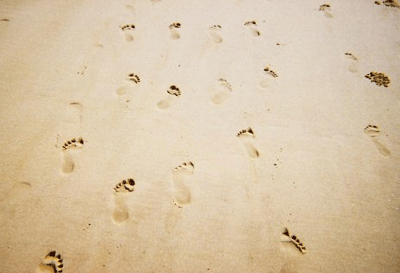
Figure 7. Footsteps in the sand from a Mozambique beach.
Dybala: Well, congratulations again on your Humanitarian Award from AAA! You very much deserve it and thank you for spending some time with me today.
Clark: Thank you!! I have first hand knowledge of so many other very deserving humanitarian audiologists around the world and I am touched to receive such recognition.
More Information:
If you are interested in participating in the Mozambique Audiology Project, you can contact Dr. Clark via her website at www.utdallas.edu/~jclark/ or by email at jclark@utdallas.edu
Clark: Certainly, my pleasure!
Dybala: Just to get things rolling, tell us about your start in the field of Audiology.
Clark: After graduating with a B.S. in Merchandising from Colorado State University and working a few years in the buying office and managing a major department store in Texas, I decided to pursue my childhood dream of being a "Speech Audio-ologist". What a shock to discover I had been using the wrong terminology, but fortunate that I could indeed follow both disciplines. So, actually my Master's Degree from UT Dallas was in Communication Disorders with a major in both Speech Pathology and Audiology. My Ph.D. from UT Dallas was in Human Development and Communication Sciences with minors in Neuroscience and Disorders of Language and Learning. I was fortunate that I could tailor my doctoral program to focus on clinically relevant topics to Audiology.
Dybala: What has your work focused on professionally?
Clark: Out of the 19 years working as a licensed audiologist, I have worked the past 7 years as a Senior Clinical Audiologist at the UT Dallas Callier Center www.callier.utdallas.edu/ with a patient case load involving diagnostic and rehabilitative/habilitative services for the crib to cane population. I am a faculty member at the UT Dallas School of Behavioral and Brain Sciences bbs.utdallas.edu/. I teach Introductory Audiology, Advanced Audiology and Pediatric Audiology. In addition to teaching duties, I enjoy researching clinical aspects/efficacy of tests of physiology and behavioral audiology (such as otoacoustic emissions, speech in noise performance, and auditory evoked potentials). Though, lately it seems that I have been on a writing "binge" with several book chapters completed and a few left in the works.
Dybala: I would also like to mention to our readers that like Dr. Clark, UT Dallas is my alma mater as well. So, without any bias whatsoever, I would like to say that the Callier Center is a really special place with some special people, and Dr. Clark is a part of that.
Clark: Well, thank you Paul. I tend to be thought of as the "special" person here at Callier, but for other reasons!!
Dybala: (Laughs) I know that you are also involved at the State and National and International levels in various professional organizations. Could you tell us about those?
Clark: Well, let's see. On the state level, for the past few years I have been the Director of Publications for the Texas Academy of Audiology newsletter (published 3x a year) with a distribution of 957 audiologists. On the national level, I have been involved with various short term committees within the American Academy of Audiology. Internationally, I am charged with the duty of a managing editor of The International Journal of Audiology, and feel privileged to interact with a number of authors and academics worldwide. I am also blessed to work with a passionate group of hearing health care professionals/audiologists around the world as the Chair of Humanitarian Audiologists Committee within the International Society of Audiology (ISA). I also have been appointed as the web liaison for ISA. My participation in the Humanitarian Audiologist Committee is one of the most rewarding areas I have been able to work in.
Dybala: If I am counting correctly, you have been traveling to Mozambique now for 7, or is it 8 years now? How did you get started and what was your inspiration for doing this?
Clark: Actually, this will be my 9th year to be "on-site" in Mozambique. I began the Mozambique Audiology Project in the fall of 1997 after two elderly ladies from my church approached me about going with their "team" to Mozambique in 1998. Of course, being a State of Texas employee, there was no chance that I could personally fund the entire audiology project, but I assured them I would give it serious consideration. After a letter writing campaign, phone calling, begging, and cajoling, I found myself with: a donated Beltone portable audiometer, a Teledyne immittance unit, a handful of hearing aids, literature on hearing and hearing loss written in Spanish, stock earmolds, tubing, glue, a years worth of batteries for the donated hearing aids, and lastly (and most importantly) my travel and room were totally underwritten! Miraculously, 1997 was the introduction of phone lines in Mozambique that allowed the missionary nurse employed at the Rural Hospital (where we were to base ourselves) to send and receive email!! Can you imagine, communicating with someone on the other side of the world - in the third poorest country in the world - responding enthusiastically about the chance of bringing audiology to the "bush" of Mozambique.

Figure 1. Mozambique children.
Well, 1998 was a small success by developed country standards, but I realized 4 years later that there was still NO AUDIOLOGY and the only HEARING AIDS dispensed in the country of Mozambique were from my project. Though the project was small it was quite a beginning and I knew what my long term goal was. They say that the sand flea in Africa will burrow deep under bared skin, and is quite difficult to get rid of. For me, Mozambique has become a sand flea - it just got under my skin.
Dybala: What is the long term goal of your Mission to Mozambique?
Clark: My job in Mozambique is to work myself OUT of a job in Mozambique!! The only way I can accomplish this goal is to have a self sustaining program with a home grown Mozambican Audiologist overseeing the multiple programs we've created. So far we've gotten some key Medical Technicals at the local hospital trained in the diagnostic evaluation, trouble shooting hearing aids, making earmold impressions and dispensing hearing aid batteries.

Figure 2. Training Medical Technicals at the local hospitals.
The key Social Action workers are trained to conduct hearing screenings to enable them to identify more children with hearing loss and then refer them to the Medical Technicals at the local hospital. Every year we interact with a cohort group of hearing impaired children that attend the local primary school. Until last year these children attended school together in one classroom with a teacher who knew a small amount of sign language. Unfortunately, the children have no advocates in the system and the curriculum was modified so that the hearing impaired children are all mainstreamed and expected to perform orally. This was not the appropriate education setting for these children with hearing impairment. This coming summer we will be setting into place a separate school for these children where they can finally be educated appropriately. One other exciting facet that we started last year was the first large scale mass hearing screening in the country of Mozambique at the primary school we work at. In 4 ½ days we managed to screen 1177 children in the 1st, 3rd, and 5th grades. We were able to refer children to an accompanying otolaryngologist for surgery or medicine if there was an apparent need; advise parents, teachers and school administrators if a child had a hearing loss; remediate with hearing aid those children who were audiologically diagnosed with hearing loss. This year we will continue the first demographic study of hearing loss in Mozambique with repeat program from last year.

Figure 3. Performing hearing screenings in the schools.
Many of the components to a successful hearing health program within the country have been laid into place, and I'll continue building until we get a qualified Mozambican to take over the reigns. In my minds-eye I see one day having ABR testing available; infant hearing screenings; cochlear implantation; and more prevalent use of hearing aids in Mozambique of the future.
Dybala: What do you see for the near future? Do you have an additional program planned for this year?
Clark: In Mozambique, the otolaryngologist joining us this year will be co-teaching with me to the physicians on anatomy of the ear, basic hearing and hearing health care; use of otoscopes; identifying and treating pathology; and possibly introduce the concept of p.e. tubes.
Dybala: You mentioned the ISA Humanitarian Audiologist Committee. Can you tell us more about the committee? Have you collaborated on with any other humanitarian efforts in other parts of the world?
Clark: Working on the Humanitarian Audiologist Committee is another passion of mine. There are so many people who return from a mission only to discover that there are number of people who have traveled to the same place with the same mission, or learn that there are audiologists locally, or that a different host would have been more amenable to the program. The purpose of the committee is to keep people from having to re-invent the wheel each time they go in the field to work. We also work rigorously to get more audiologists to become aware of the World Health Organization Guidelines for providing hearing health care and hearing aids in developing countries. There are a number of programs we are working on, and currently I have an email address list of over 400 world-wide humanitarian audiologists/hearing health care professionals. The Humanitarian Audiologist Committee within ISA continues to grow since its inception just about 4 years ago!! It's an exciting time.
As far as other humanitarian efforts, I've been asked to start similar programs in Camaroon, Malawi, and other developing countries. The gypsy side of me would love to do just that - the state employee side of me realizes the impossibility of such a notion. What I do in Mozambique really is not unique. This is what makes the ISA Humanitarian Audiologist Committee work so important. It's possible to easily pass along strategies, guidelines, visions to many other compassionate people with a desire to help who have the capability of making a commitment to Camaroon, etc.
Dybala: Tell us about the preparation that you have to undergo to make your mission work. How much do you have to raise in the way of equipment, supplies and money?
Clark: It takes me a full year to be prepared for the 2 week on site program in Mozambique. Travel costs alone are approximately $2200; room & board while on site is an additional $400 that all comes out of pocket or donation. I've been quite fortunate over the years to build a good relationship with compassionate industry folks from Widex, Rexton, Phonak, Starkey, Hal-Hen, Oak Tree, Insta-Mold, Sy Kessler Sales, GSI, and Biologic who have either donated or provided tremendous discounts for products. We typically dispense between 20 - 30 hearing aids, with the necessary supplies during our 2 week stay. You can imagine the exponential demand on products that such a program would create. The more hearing aids dispensed in Mozambique, the greater the demand for batteries and supplies. It becomes a vicious circle, but SO FAR, I am still able to bounce around inside of that circle!
Dybala: I am tired just thinking about all that you have to do each year just to prepare for a 2 week trip, let alone the amount of work during the trip. I have to ask, what keeps you going?
Clark: Sometimes the host in Mozambique worries about imposing too much on us during the 2 week mission. I just remind them I have plenty of time to rest when I'm dead. When you spend so much time and effort to get half-way across the world, you don't want to waste one micro second of the time allotted. I've never been able to sit still and end up hunting down things to keep occupied with if there isn't enough to do. Unlike U.S. culture, African culture seems to accept inactivity and lack of a forward movement to programs. I've discovered that while in Mozambique there is a high probability that any program I plan for on one day may not happen, and always have back-up programs for the day. Consequently, I maintain a number of programs in Mozambique.

Figure 4. Dr. Clark performing an otoscopic exam.
Dybala: Do you have any students or faculty members come along with you?
Clark: Part of being on faculty in a university is to demonstrate standard care of practice. It goes without saying that my standard care of practice sphere has expanded markedly since 1997. It's exciting to have students join in the project since they see so many pathologies and interesting cases they would NEVER see in the U.S. Can you also imagine being a 2nd year Au.D. student and taking a patient from triage through dispensing a hearing aid in one encounter? Of course the students are supervised, but they are forced to think while working, question ideas they may have heard in the classroom, seek culturally sensitive means of counseling patients, and adapt to the stark realities working in the realms of a developing country where computers and probe mic measures are non-existent.

Figure 5. A student performs otoscopy on children waiting to be screened
Over the years I've had some of my own students from UT Dallas as well as students from other universities around the world join me in Mozambique. Though I come close each year, I still have not been successful in having other faculty members from UT Dallas accompany me. The Mozambique Audiology Project Multi-national Team members that I had with me for 2005 included: Denise Herrara, of University of Texas in Austin, Texas; Darrell and Sissy Johnson, of Austin, Texas; Tendekayi Katsiga of Otse, Botswana; Dwalilani Keatholetswe of Otse, Botswana; Victoria Lee of Northwestern University; Crystal Rolf of Wales, United Kingdom; Julie Verhoff of UT Dallas/Callier Center; and Kathleen Wemmer or Johannesburg, South Africa.
Dybala: As we sit in your office, I see that you have several pieces of native art that you have brought back from Mozambique. Out of all of your trips, what are the top 3 memories that you have from your missions?
Clark: You've given me a pretty tall order to limit the millions of joyful and sad memories since 1998 in Mozambique! Let me try!
Last year I met little 6 year old Belucha, who had the eyes of a distrusting 80 year old. She appeared to come from a harsh background and would not trust any adults. In all of my years in pediatric audiology, I've never come across a child so terrified of what an adult might do to her when we were attempting to simply screen her with an OAE, or audio or tymp. We eventually persevered and discovered that she has a severe hearing loss and would likely achieve good benefit with hearing aids. It took quite a bit of time to get the earmold impressions completed and hearing aid fit, but her beautiful smile (showing rotten teeth) made the ordeal abundantly worthwhile for me.

Figure 6. Belucha.
Servalito was the first person in Mozambique to receive hearing aids. This seemed appropriate to me since Servalito is an orphan who showed up roaming in the town as a toddler, and no one knew his story. When I met the very street-wise Servalito in 1998 he was approximately 16 years old with a number of self-created hand-signs, and he lived at the orphanage. Dispensing hearing aids to him was an eye opener for the Medical Technicals I train since they had never seen a "hearing apparatus", and were quite impressed with what a person might be able to hear. Every year that I've returned, Servalito seemed to know that I arrived in Mozambique and would come where ever I was staying to say "hello".
Reverend Metatiki is quite unusual by Mozambique standards; he has survived 40 years beyond life expectancy to 80 years old. He speaks good English and enjoys engaging English speakers in conversation to maintain his English skills. After being audiologically diagnosed with a moderate to severe hearing loss and subsequently dispensed a hearing aid with supplies he was counseled thoroughly about care and use of the hearing aid. Before he was released, he demonstrated successful insertion and removal of the instrument 3 times. Don't you know that the very next night the local people were having a Thank You reception for us, and there was Rev. Metatiki proudly wearing his hearing aid with the earmold behind his pinna and the BTE in front of the pinna!! I still smile each year when I visit with Rev. Metatiki remembering his first experience with amplification!
Dybala: Those are amazing stories! If a person wanted to go with you on your mission, or simply wanted to help fund the mission, what would they need to do?
Clark: I welcome anyone to go to Mozambique with me. This year the team will be meeting me in Johannesburg on Thursday, August 3rd and we will all travel together into Mozambique on the 4th. Some team members will leave after 1 week and the rest of us will be staying 2 weeks. Again, it is totally self-funded and the $2500+ price tag per person is worth every penny. I am prepared to accept donations of used, working, broken, new hearing aids that may be used in the mission or sent to Starkey for product credit. Donations of hearing aid batteries (#13 or 675), tubing and cleaning supplies, frequent flier miles, or monetary donations are always welcome. It is possible for me to send an acknowledgement of charitable donations for income tax purposes. One would only need to designate if the monetary donations are to be used for travel, supplies and hearing aids, or education for the hearing impaired children. My email address is: jclark@utdallas.edu

Figure 7. Footsteps in the sand from a Mozambique beach.
Dybala: Well, congratulations again on your Humanitarian Award from AAA! You very much deserve it and thank you for spending some time with me today.
Clark: Thank you!! I have first hand knowledge of so many other very deserving humanitarian audiologists around the world and I am touched to receive such recognition.
More Information:
If you are interested in participating in the Mozambique Audiology Project, you can contact Dr. Clark via her website at www.utdallas.edu/~jclark/ or by email at jclark@utdallas.edu

